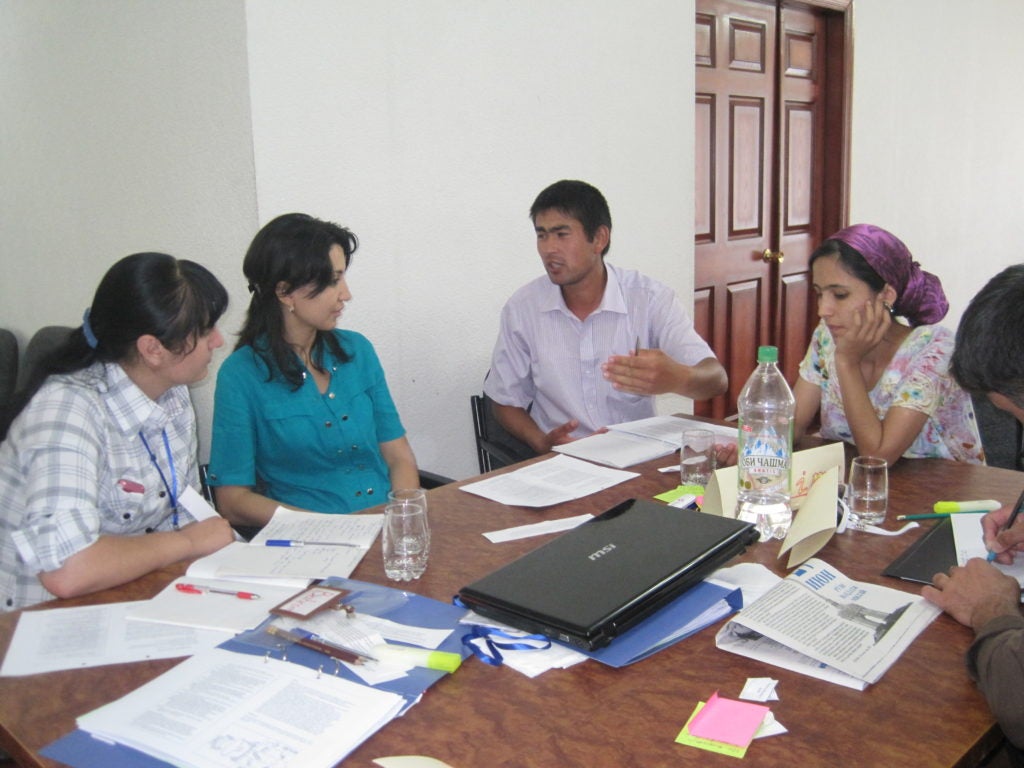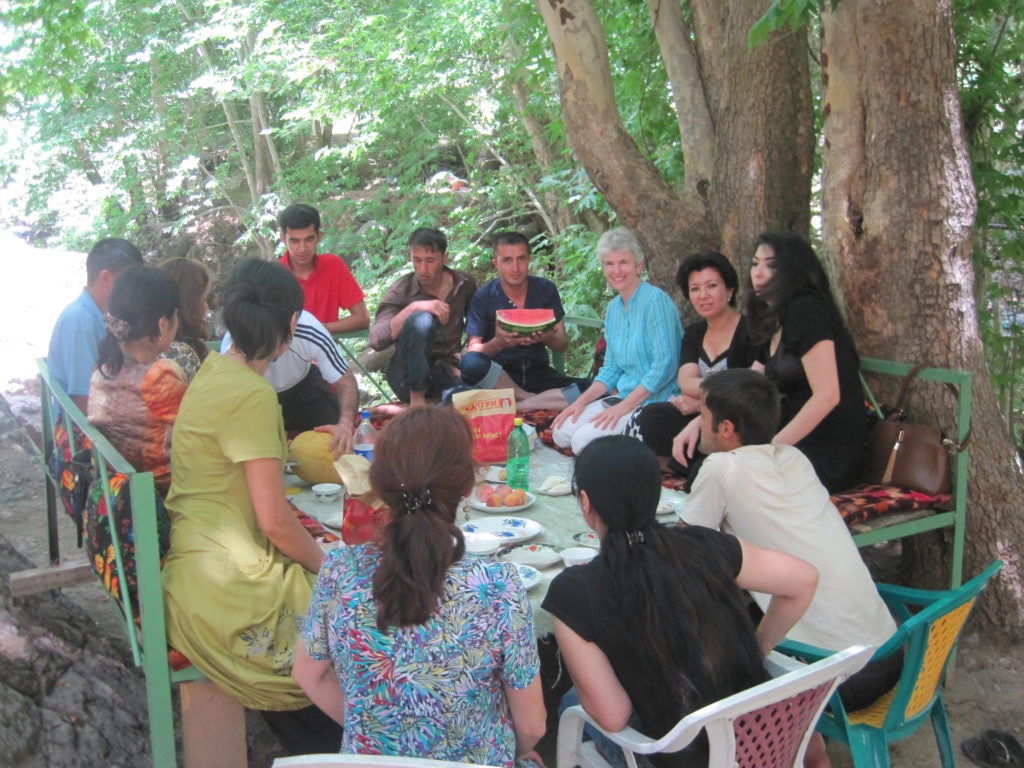“[My role was] building on the Specialists and Fellows who had been there before me, adding my experience to their efforts.”
Dr. Katherine (Kitty) Purgason wasted no time as an English Language Specialist during her 2013 English Teacher Mentor Training (EMT) assignment in Tajikistan. During that two-week training, Purgason covered such concepts as scaffolding, classroom management, assessment, learning styles, and lesson planning, using such interactive approaches as information gaps, card playing, jigsaw readings, walk-and-talks, question cards, think-pair-share, running dictations, and jazz chants. All this took place while she also worked with participants on how to apply those techniques to lessons on reading, writing, listening, speaking, grammar, vocabulary, and culture. “Perhaps it was a firehose of activity for the participants — I always have 100 things I want to convey — but they quickly warmed to my approach,” says Purgason. “That’s why it was so gratifying to see their enthusiasm and progress throughout the training.”

Although this was Purgason’s first EMT assignment, her background as an English language educator prepared her well for the project. She has worked abroad in 13 countries as a Specialist, Fulbright Scholar, and guest lecturer; published numerous papers on teaching methodology and practices; and developed curricula for overseas English language programs. In addition, in preparation for the EMT assignment, Purgason communicated with past Specialists who had conducted similar trainings, as well as with the English Language Fellow in Tajikistan who had worked earlier that spring with this latest cohort of EMT participants. Introduced in Tajikistan in 2009, the EMT is a 12-month program in which a group of English language teachers participate in teacher trainings throughout the year, eventually sharing what they have learned with educators in their institutions and regions. Each year, a new cohort of teachers is chosen, creating what Purgason calls “a cascade of new English language teaching practices.” Within Tajikistan’s mentor program, she viewed her role as “building on the Specialists and Fellows who had been there before me, adding my experience to their efforts.”
Purgason also added her seemingly boundless enthusiasm and energy to the mix. During the intensive training — five hours per day, six days a week — she tackled the task of preparing participants for mentorship with a whirlwind of activity that began on the first day. Purgason focused that initial week on blending an assortment of practical topics with a variety of teaching techniques. Learning styles were covered in a jigsaw activity that divided participants into four separate groups, with each group reading and discussing a paragraph on a specific learning style. Groups were then reconfigured, so the four learning styles were represented in each group, and participants taught one another. “First, here’s some content related to second language acquisition, and second, here’s some pedagogy — jigsaw readings — to go with it,” says Purgason. Other examples of her layering approach to content and application included question card activities that covered grammar, conversation, and assessment, and role-playing activities that addressed classroom management. “I wanted them to keep applying these techniques in different ways,” notes Purgason. “Then, we’d come together, put our teacher hats back on, and explore what worked and didn’t work, as well as examine other ways these activities could be used in their classes.”

The mentor training was not without its challenges, chief among them being the wide range in participants’ English language proficiency. “Some seemed to understand only about 10% of what I said while others were at the 90% level,” she recalls. “It seemed to annoy the higher proficiency participants, who were frustrated that these lower-level teachers had been chosen for the cohort, particularly since they were working in mixed-level groups.” That in turn created anxiety for the less proficient participants, who were often reluctant to participate because of their comparatively weaker English language skills. Purgason recalls that during the second week, when participants’ presentations and demonstrations were the focus, one teacher did not attend the session on the day of his demonstration, citing illness. When Purgason found him sitting in front of the building, he told her he was ashamed of his English. She worked with him individually, offering ideas for a simple demonstration. In the end, he presented, and while it was not exactly what Purgason had in mind, “it wasn’t about him demonstrating what he’d learned, but about him overcoming his fear of speaking English,” says Purgason. “I realized this was also an important reason why I was there — to help participants improve their English, not just learn ways to improve their students’ language skills.”
“I was constantly learning, refining, and expanding my knowledge. I love that part of being a teacher — I knew something about this aspect of teaching, and now I know more.”
Higher proficiency participants presented a different challenge. Purgason notes that often the demonstrations of those more skilled in English indicated their misunderstanding of or discomfort with an activity. One participant who chose to present a group activity using picture cards, handed the cards out to group members, then called on each, one at a time, to stand up and recite what they saw on their card. “I’d demonstrated at least five creative ways to use these cards, none of which he decided to try,” recalls Purgason. “But I understood why. Tajikistan has a rigid teaching paradigm, so it was easy for participants to default to what was familiar. After a lifetime in an education system of ‘learn and repeat,’ it was difficult for them to switch gears to a teaching practice of ‘imagine and apply’.” Yet even when demonstrations revealed that participants had clearly missed the point of an activity, Purgason saw teaching opportunities. After demonstrations, when it came time to debrief with participants, she asked them to reflect on what they had observed. “I wanted them to come to their own conclusions about best teaching practices,” she says.

For Purgason, Specialist assignments such as the EMT program are always two-way streets. Her goal is to train participants to be better English language teachers, but she also considers it an opportunity to extend her expertise. Training this mixed proficiency group of English language educators, Purgason saw an opportunity to put into practice what she had studied over the years. “I’d ask myself, ‘How about if I try this?’ Then, ‘Aha, that worked. Now let’s try this.’ I was constantly learning, refining, and expanding my knowledge. I love that part of being a teacher — I knew something about this aspect of teaching, and now I know more.”

Kitty Purgason is Professor Emerita at Biola University, California, where she trained ESL/EFL teachers. She has worked in Korea, China, Indonesia, Vietnam, Tajikistan, Turkmenistan, Turkey, Kuwait, Oman, and Spain. She has a Ph.D. in Applied Linguistics from UCLA. Her professional interests include methodology in local context and professional ethics.
